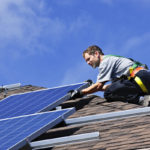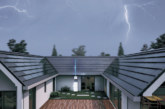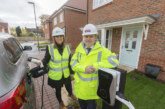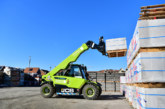Paul Hutchens, green energy advocate and CEO of solar installation specialists Eco2Solar, explores the key questions housebuilders and developers should be asking when choosing a solar installation contractor.
Are they skilled?
Housebuilders and developers may sometimes be tempted to allocate the complex task of solar installation to an existing contractor, like a roofer or electrician. While this might seem like a potential cost-cutting measure at first, it usually ends up being more expensive in the long term.
There are so many critical elements to a successful solar installation – especially when it comes to snags, issues, high-voltage electrical connections, safety certifications and complex installations like flat-roof projects that require specialist fastening and low-ballast systems – that relying a roofer or electrician who’s done the occasional solar project can bring unnecessary risks and delays.
Make sure your chosen solar supplier not only has extensive installation experience, but is fully competent in complex installations and connections too. They’ll need to be able to wire the panels from an AC and DC perspective, and be experienced in liaising with the relevant District Network Operator to ensure relevant permissions are given; all in time for your buyers to move in.
Are they reliable?
Reliability is an interesting topic when it comes to construction – the process can often be disjointed because there are so many subcontractors on site doing so many different things. Many of these projects are reliant on each other, and if one thing isn’t completed on time, there’s often a domino effect where unnecessary delays and backlogs happen.
That’s why it’s essential that housebuilders can fully trust all their contractors to be on site exactly when they’re supposed to be, and to complete the job within the timeline they proposed. Key to that is choosing a contractor who has a culture of reliability fully embedded into their operation.
Is their work up to spec?
A reliable solar installation specialist should have effective quality control systems in place, from monitoring and recording progress throughout every phase of the installation, to taking pictures at key stages of the project and tracking their attendance on site.
This is beneficial for site managers because it saves them having to chase and check quality at every stage themselves, but it’s also a key part of service delivery for your solar partner because they can maintain a high standard of output and allocate additional training to their operatives if required.
Is their installation package up to spec?
There’s always a slight disconnect between the commercial, technical and site elements of housebuilding. The commercial team seek value for money and ways to construct as cost-effectively as possible; the technical team want to make sure the products they use are technically excellent and installed properly; the site team are responsible for completing the build itself.
With different elements having different objectives, your chosen solar partner should be able to deliver all of those elements. It’s their responsibility to bring you a technically excellent package that’s commercially viable and delivered on site without delays. They should also instigate regular review meetings with you to keep every element up to date and ensure the process runs smoothly.
Are they future-focused?
Each housebuilder must meet a particular set of renewable energy targets and objectives set by their Local Authority. While planning systems vary by region (Scottish regulations encourage every new house to be fitted with solar), there are trends on the horizon that your solar partner should be ready to advise you on.
For example, homeowners won’t be able to install gas-fired heating from 2025, so electricity is likely to be the only viable option. From 2030, the UK will need to meet government targets to halve the amount of energy each new house uses. From 2040, we’ll no longer be able to sell petrol and diesel cars in the UK, and – most significantly – from 2050, our goal as a country is to reach Net Zero.
Your solar partner should have a thorough understanding of the global issues and targets that are influencing the use of renewable energy products, and be able to anticipate future trend and demand. They must then interpret those trends at ground-level, and find the most efficient and cost-effective ways to apply them for the housebuilder; today and into the future.









